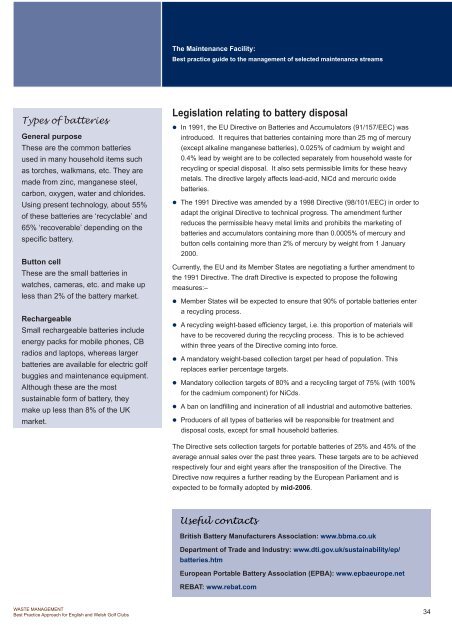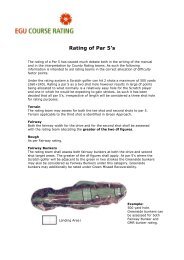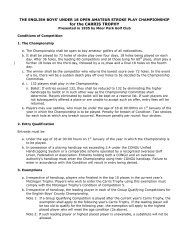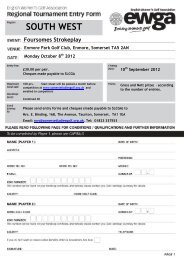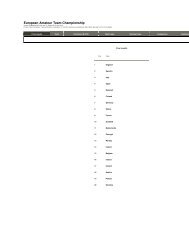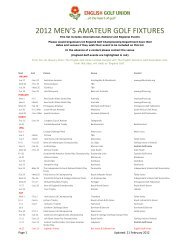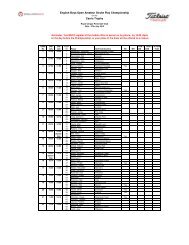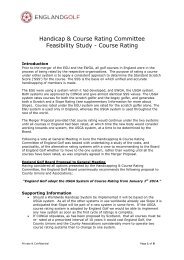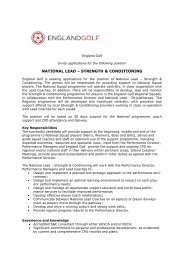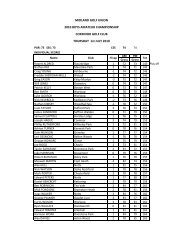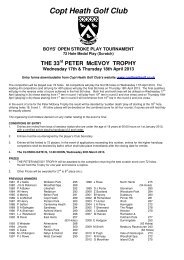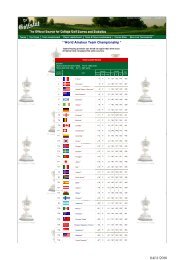Waste management - England Golf
Waste management - England Golf
Waste management - England Golf
You also want an ePaper? Increase the reach of your titles
YUMPU automatically turns print PDFs into web optimized ePapers that Google loves.
The Maintenance Facility:<br />
Best practice guide to the <strong>management</strong> of selected maintenance streams<br />
Types of batteries<br />
General purpose<br />
These are the common batteries<br />
used in many household items such<br />
as torches, walkmans, etc. They are<br />
made from zinc, manganese steel,<br />
carbon, oxygen, water and chlorides.<br />
Using present technology, about 55%<br />
of these batteries are ‘recyclable’ and<br />
65% ‘recoverable’ depending on the<br />
specific battery.<br />
Button cell<br />
These are the small batteries in<br />
watches, cameras, etc. and make up<br />
less than 2% of the battery market.<br />
Rechargeable<br />
Small rechargeable batteries include<br />
energy packs for mobile phones, CB<br />
radios and laptops, whereas larger<br />
batteries are available for electric golf<br />
buggies and maintenance equipment.<br />
Although these are the most<br />
sustainable form of battery, they<br />
make up less than 8% of the UK<br />
market.<br />
Legislation relating to battery disposal<br />
In 1991, the EU Directive on Batteries and Accumulators (91/157/EEC) was<br />
introduced. It requires that batteries containing more than 25 mg of mercury<br />
(except alkaline manganese batteries), 0.025% of cadmium by weight and<br />
0.4% lead by weight are to be collected separately from household waste for<br />
recycling or special disposal. It also sets permissible limits for these heavy<br />
metals. The directive largely affects lead-acid, NiCd and mercuric oxide<br />
batteries.<br />
The 1991 Directive was amended by a 1998 Directive (98/101/EEC) in order to<br />
adapt the original Directive to technical progress. The amendment further<br />
reduces the permissible heavy metal limits and prohibits the marketing of<br />
batteries and accumulators containing more than 0.0005% of mercury and<br />
button cells containing more than 2% of mercury by weight from 1 January<br />
2000.<br />
Currently, the EU and its Member States are negotiating a further amendment to<br />
the 1991 Directive. The draft Directive is expected to propose the following<br />
measures:–<br />
Member States will be expected to ensure that 90% of portable batteries enter<br />
a recycling process.<br />
A recycling weight-based efficiency target, i.e. this proportion of materials will<br />
have to be recovered during the recycling process. This is to be achieved<br />
within three years of the Directive coming into force.<br />
A mandatory weight-based collection target per head of population. This<br />
replaces earlier percentage targets.<br />
Mandatory collection targets of 80% and a recycling target of 75% (with 100%<br />
for the cadmium component) for NiCds.<br />
A ban on landfilling and incineration of all industrial and automotive batteries.<br />
Producers of all types of batteries will be responsible for treatment and<br />
disposal costs, except for small household batteries.<br />
The Directive sets collection targets for portable batteries of 25% and 45% of the<br />
average annual sales over the past three years. These targets are to be achieved<br />
respectively four and eight years after the transposition of the Directive. The<br />
Directive now requires a further reading by the European Parliament and is<br />
expected to be formally adopted by mid-2006.<br />
Useful contacts<br />
British Battery Manufacturers Association: www.bbma.co.uk<br />
Department of Trade and Industry: www.dti.gov.uk/sustainability/ep/<br />
batteries.htm<br />
European Portable Battery Association (EPBA): www.epbaeurope.net<br />
REBAT: www.rebat.com<br />
WASTE MANAGEMENT<br />
Best Practice Approach for English and Welsh <strong>Golf</strong> Clubs<br />
34


